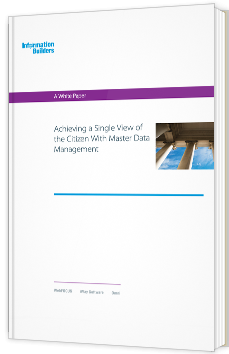

Obtenir une vue à 360° des citoyens grâce au Master Data Management.

"Under constant budget pressure and increasing demand for services, government organizations are challenged to operate more like private sector organizations. They need to deliver costeffective services and be more efficient and accessible. Furthermore, government organizations operate in an environment where compliance and transparency are expected, supported by legacy systems, processes, and people.
Like private sector organizations, governments are increasingly turning to an asset they have long neglected – their data – to overcome these challenges. They are modernizing and consolidating their data management and governance, and are using data to support evidence-based decisionmaking. Unfortunately, there are many technical challenges to integration, cleansing, mastering, and mining data that resides in operational, legacy, packaged, or homegrown systems for actionable insights.
As a result, government agencies are awash in data and are “data rich, but information poor.” Data originates from a multitude of systems that were procured or developed independently – with no thought that one day they might have to be integrated with each other. Worse yet, the data may be coming from other agencies, or is dirty, duplicative, and inconsistent. Assuming it can be accessed and cleaned, it’s of limited use because very few people can work with it in intuitive ways to gain insights, let alone operationalize them.
To help solve this challenge, public sector organizations are increasingly implementing technology to achieve a single view of the citizen. The term “single view of the citizen” refers to the consolidation, cleansing, and synchronization of individuals and entities so that workers at every level – from executives to managers and front-line workers – have accurate and reliable views of each person or entity. This allows actionable insights on the people, programs, and departments that they operate."